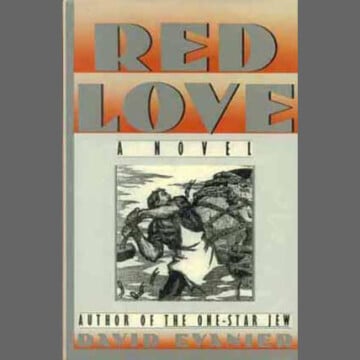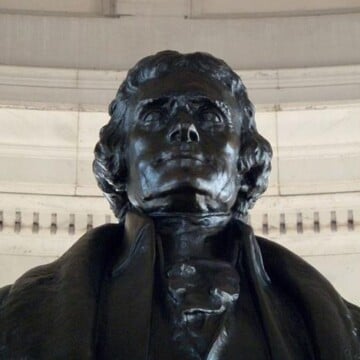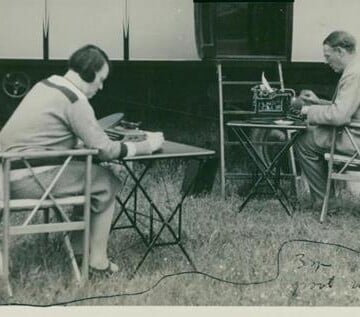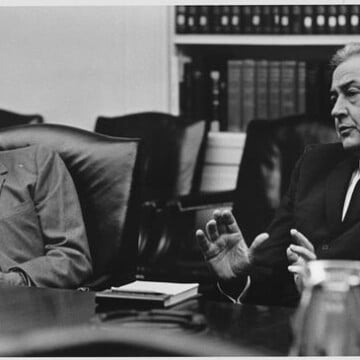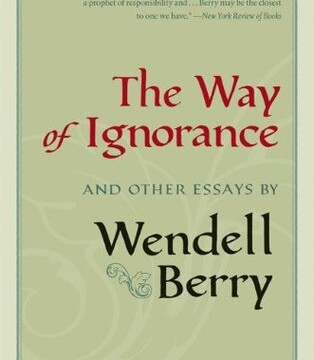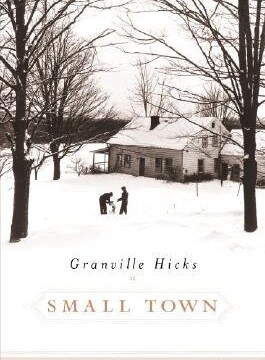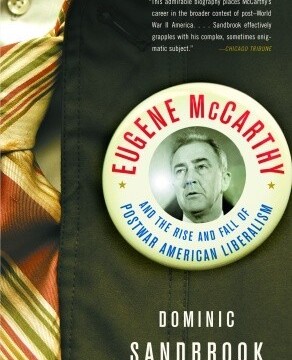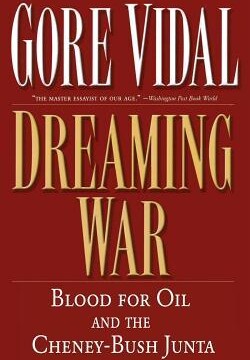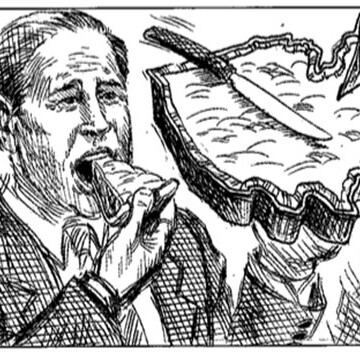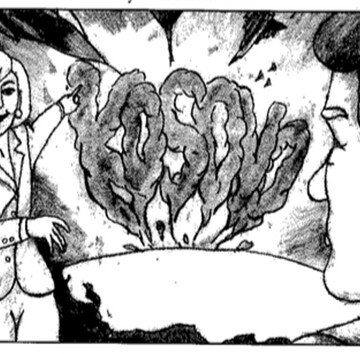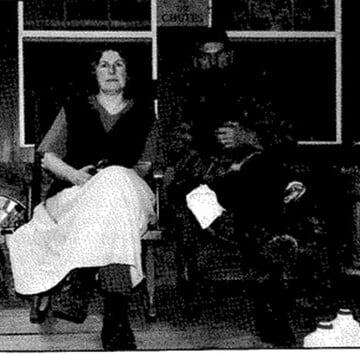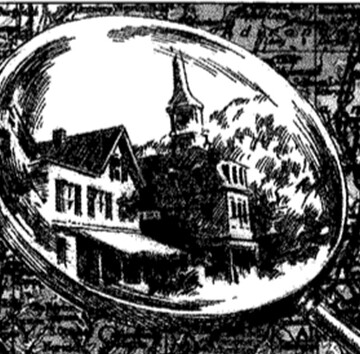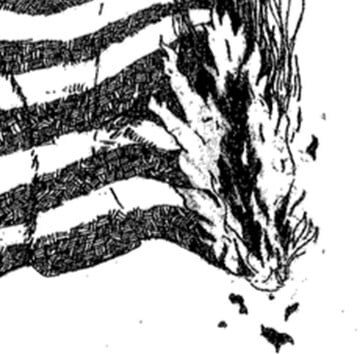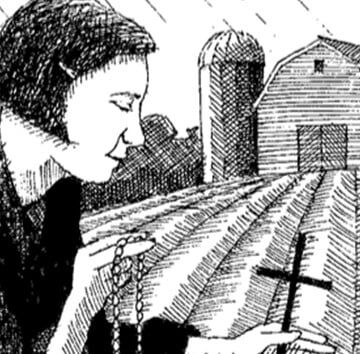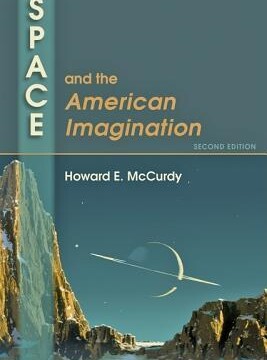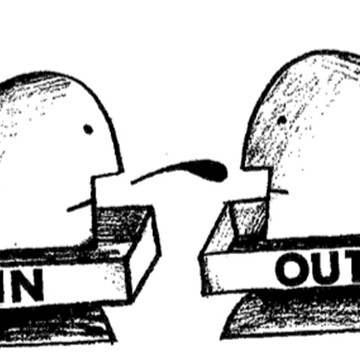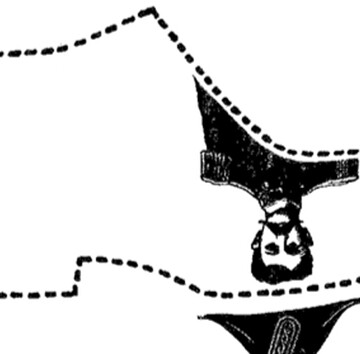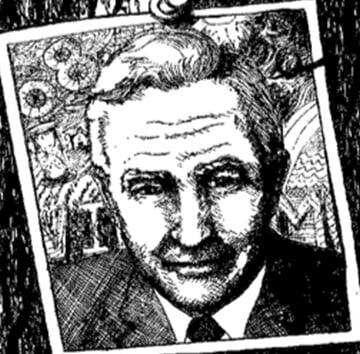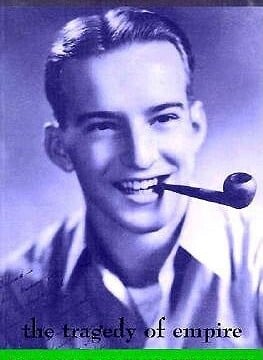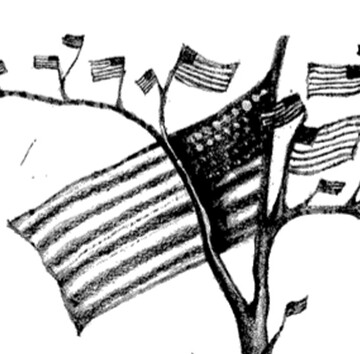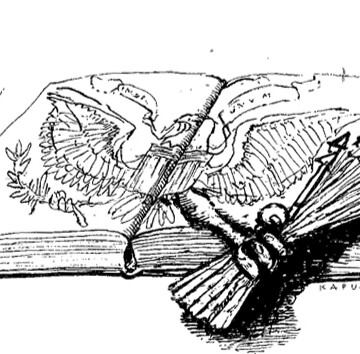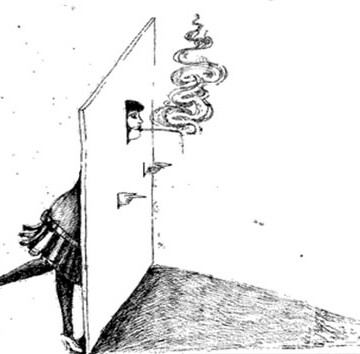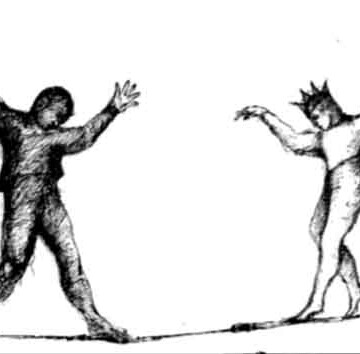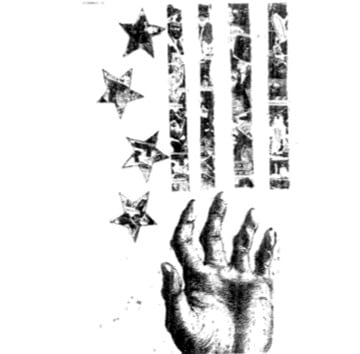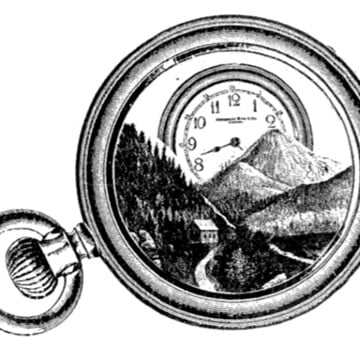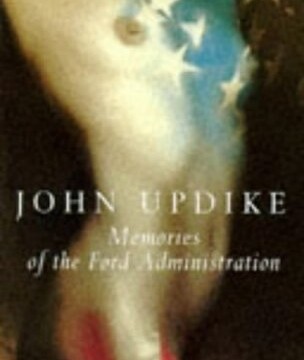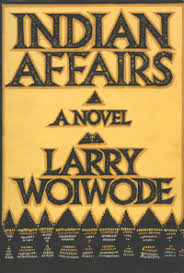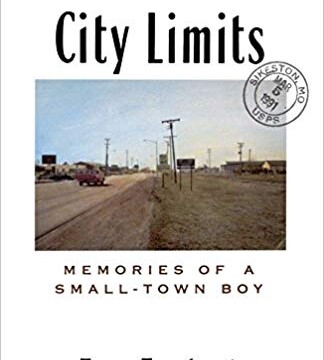[This review first appeared in the June 1991 issue of Chronicles.] Red Love is “third generation Leninist” porno star Suzie Sizzle’s yet-unmade dream project, the love story of her aunt and uncle, the Rosenberg-like spies Dolly and Solly Rubell. Until Suzie’s industry develops a revolutionary consciousness, we’ll have to settle for David Evanier’s novel of...
Author: Bill Kauffman (Bill Kauffman)
The Last Jeffersonian
From the December 1990 issue of Chronicles. Let Vermont State Senator John McClaughry describe himself (with what he calls “a notorious Ozark accent”): “I am a 1700’s Virginia republican, an 1800 Tertium Quid, an 1830’s Loco Foco, an 1850’s Republican, an 1890’s Western progressive, a 1930’s agrarian distributist, and today a plain old decentralist agrarian...
Sinclair Lewis
From the August 1992 issue of Chronicles. Late in life, Harry Sinclair Lewis of Sauk Centre, Minnesota, figured something out: he would soon be forgotten. In a mock self-obituary, Lewis foresaw that he would leave “no literary descendants. . . . Whether this is a basic criticism of [Lewis’s] pretensions to power and originality, or...
War From a Cabbage Patch
“Gene just isn’t a nice person.” —Bobby Kennedy You know you are not in for a Doris Kearns Goodwin/David McCullough hagiography when a biographer uses as an epigraph a character assessment by the thuggish Marilyn-mauling (Joe) McCarthyite RFK. (Isn’t the three-letter monogram usually a tip-off to a sinister force?) In March 1968, Eugene McCarthy earned...
Cherished Void
From the July 1995 issue of Chronicles. Gene Roddenberry was a hustling ex-cop who wanted to strike it rich in television, and he did, with a series called Star Trek, which he once described (before his slide into self-mythicizing and lucrative licensing deals) as “Wagon Train To the Stars.” His public image has heretofore been...
New York vs. New York
From the July 2001 issue of Chronicles. “The feeling between this city and the hayseeds. . . is every hit as hitter as the feelings between the North and South before the War. . . . Why, I know a lot of men in my district who would like nothin’ better...
Up, Up, and Away
From the June 1998 issue of Chronicles In a recent PBS documentary about the exploration of Mars, a NASA scientist lectured, “We are, after all, one planet. . . . Once we get ofFour planet, especially once there’s a colony on another planet, national boundaries start to become really insignificant. . . . The New...
The Way Home
Wendell Berry’s latest harvest of essays contains characteristically wise observations on mobility, industrial agriculture, and other maladies of our age, but it also displays a Berry seldom glimpsed—that is, Wendell Berry as a rural Kentucky Democrat reluctant to quit a party that long ago quit rural America. He even titles one short piece “Some Notes...
Hicks’ Town
In 1932, Marxist literary critic Granville Hicks and his wife, Dorothy, bought an eight-room farmhouse in Grafton, New York, a rural hamlet ten miles east of Troy, where Hicks taught English to the young engineers at Rensselaer Polytechnic Institute. For three years, they lived as summer people, aestivating intellectuals, divorced from the community. But when...
War From a Cabbage Patch
“Gene just isn’t a nice person.” —Bobby Kennedy You know you are not in for a Doris Kearns Goodwin/David McCullough hagiography when a biographer uses as an epigraph a character assessment by the thuggish Marilyn-mauling (Joe) McCarthyite RFK. (Isn’t the three-letter monogram usually a tip-off to a sinister force?) In March 1968, Eugene McCarthy earned...
The Patriot
Edward Abbey used to say that he took great pride in getting more radical as he got older—no easy task for the anarchist son of a communist father, but an impeccably American maturation just the same. As the American Empire staggers into senseless senescence, what patriot, whether populist, reactionary, or just cantankerously American, isn’t being...
New York vs. New York
“The feeling between this city and the hayseeds. . .is every hit as hitter as the feelings between the North and South before the War. . . . Why, I know a lot of men in my district who would like nothin’ better than to go out gunnin for hayseeds.” —George...
“I’m Liberated; Free at Last!”
Pat Buchanan has taken more punches than Chuck Wepner, hut unlike the Bayonne Bleeder, Buchanan has a good right hook (or is it now a left?) of his own. The year began with Buchanan defending his feisty anti-interventionist manifesto A Republic, Not an Empire: Not since the days of Arkansas Sen. William Fulbright, the one...
Come Home, America
Greetings from New York, where a new hate crime is taking shape: It is called “place-ism,” and it will be defined in the criminal code as the belief that a particular place, be it a neighborhood, village, city, or state, is superior to any other place, and that the residents of this place have a...
Blame America First
“America First,” he said, whereupon the skies opened, the thunder cracked, the rains came . . . who knew the empire was so sensitive? The corporate-media response to Patrick J. Buchanan’s A Republic, Not an Empire—and when is the last time a presidential candidate wrote his own campaign book?—rivals the Two-Minute Hates directed at Goldstein...
The Militia of Love
Carolyn Chute’s return address includes the postscript, “No Fax/No Phone/No Paved Road.” The self-taught novelist of Maine’s backwoods can add “No More Good Reviews,” for with her latest book, Snow Man, she has committed an unpardonable act of literary patriotism: She depicts a militiaman as a human being. We came to Chute’s Parsonsfield from Concord,...
The Making of an Individualist
“To be merely queer is no achievement, but to be brilliantly individualistic is a fine art which Geneva brought to perfection,” wrote Warren Hunting Smith, who died last November at the age of 93. Mr. Smith lived something of a double life. He was an editor of the Yale Edition of the Horace Walpole correspondence,...
The Anti-American Century
The anti-American Century began with a bad moon rising. Our new possessions across the sea were awash in colonial gore. Surveying from afar the corpses of Filipino independence fighters and our blood-spattered flag, Mark Twain suggested that we substitute the skull and crossbones for the stars and stripes. The Indiana-bred poet William Vaughn Moody, a...
Massacre in Littleton
Eric Harris, the dominant half of the trenchcoated psychopathic duo who rampaged through Columbine High School in Littleton, Colorado, was the demented product of two enduring legacies of the Cold War: the consolidated super-school and the rootless military family. This is guaranteed not to be the conclusion of the sham National Dialogue that always follows...
The Conquest of the United States and Puerto Rico
On the matter of statehood, Puerto Rico’s outstanding novelist has written . . . actually, I have no idea what he has written, because I do not read Spanish, nor do I plan to learn. Should our flag be defaced by a 51st star for Puerto Rico—which is, admittedly, more deserving of stellification than the...
Another Election Day Come and Gone
Election Day 1998 dawned as a November morning out of William Cullen Bryant, with “piercing winter frost, and winds, and darkened air.” We walked to the firehall polling place, passing the pioneer cemetery, burial ground of veterans of the Revolution, all those Ebenezers and Ethans who cleared the land and endured Valley Forge so that...
Dorothy Day and the American Right
The title “Dorothy Day and the American Right” promises a merciful brevity, along the lines of “Commandments We Have Kept” by the Kennedy Brothers. After all, the founder of the Catholic Worker movement and editor of its newspaper lived among the poor, refused to participate in air-raid drills, and preferred Cesar Chavez to Bebe Rebozo....
The Hollywood Ten(nessean)
Fifty years have passed since the orgy of squealing and sanctimony, of perfidy and posturing, that begat the Hollywood blacklist. What a cast of characters paraded before the House Un-American Activities Committee (HUAC): at this table, communist screenwriters making $2,000 a week scribbling claptrap and convincing themselves that it was revolution; and at that table,...
Up, Up, and Away
In a recent PBS documentary about the exploration of Mars, a NASA scientist lectured, “We are, after all, one planet. . . . Once we get ofFour planet, especially once there’s a colony on another planet, national boundaries start to become really insignificant. . . . The New World Order isn’t going to be America...
Don’t Feed the War Machine
“His sympathies were for race—too lofty to descend to persons,” a wit once said of the abolitionist Senator Sumner. For how else could a man countenance the slaughter of his countrymen, not only rebel Southerners but noble Robert Gould Shaw and Berkshires boys, too? The most dangerous people—the ones who will kill you for your...
A Well-Preserved Woman
My wife is president of our county’s landmark society, and though my inability to tell a cornice from a frieze renders me a hapless consort in matters architectural—more Denis Thatcher than Hillary Clinton—I am nonetheless proud of her. For preservation seems to me far less an aesthetic ruffle than an emotional and spiritual necessity. “Preservation”...
World Citizens on Main Street
“It’s a small, small world,” or so chirp the marionettes of Michael Eisner’s Disney, the outfit that brought you NHL hockey in Orange County and a free Pocahontas glass with the purchase of a Happy Meal at the McDonald’s in Ouagadougou, Burkina Faso. In fact it is not a small world, at least for those...
A GOP Event
Republican Congressman Steven Gunderson of Wisconsin, who hosted the homosexual “circuit” party called the Cherry Jubilee at a federal building in Washington last April 13, was upset by our article about the event written by Marc Morano (“Sex, Drugs, and a Republican Party,” July 1996). When Congressman Robert Dornan (R-CA) read the Chronicles article into...
A Mighty Long Fall: An Interview With Eugene McCarthy
Senator Eugene McCarthy is America’s senior statesman without a party. An Irish-German Minnesota Catholic who left the seminary for academe, McCarthy was elected to the House of Representatives in 1948 and the Senate in 1958. He was the link between the Old Progressives of the Upper Midwest and the postwar liberals; as time goes by,...
The Spirit of Atlantic
“The Empire is peace.” —Napoleon III Bill Williams was an Eagle Scout, basketball star, paperboy, and jazz drummer in the Atlantic, Iowa, of the Depression. He was a wholesome mixture of small-town bohemian and Jimmy Stewart: he shared bottomless ice cream sodas with his girlfriend and read Hemingway; he played piano and made a soapbox...
Who Can We Shoot?
Who better to kick off a discussion of American populism than Henry James? In The Portrait of a Lady Sockless Hank had Henrietta Stackpole define a “cosmopolite”: “That means he’s a little of everything and not much of any. I must say I think patriotism is like charity—it begins at home.” Likewise, a healthy populism...
Colin Powell, R.I.P.?
With impeccable timing, I interviewed Eisenhower biographer and Colin Powell booster Stephen E. Ambrose just days before Powell’s Noble Renunciation of Ambition. But before our chat disappears into that void (de?)populated by Milton Shapp’s Inaugural Address and the Oscar acceptance speech of Pauly Shore, I retrieve this exchange: Me: One way to look at Eisenhower...
Last of the Taft Republicans?
Bob Dole is the last of the Taft Republicans, according to Murray Kempton—if only it were so! Isolationists (that is, Middle Americans who do not want our sons or brothers sent to die or kill on foreign sands) cherish Dole’s remark in his 1976 vice presidential debate with the dreary Mondale: “I figured up the...
Cherished Void
Gene Roddenberry was a hustling ex-cop who wanted to strike it rich in television, and he did, with a series called Star Trek, which he once described (before his slide into self-mythicizing and lucrative licensing deals) as “Wagon Train To the Stars.” His public image has heretofore been that of the atheistic Gentle Ben of...
Once Upon a Time in America
One of the strangest rituals in the United States Senate is the annual reading of President Washington’s Farewell Address. The chore of recitation usually falls to a freshman nonentity eager to curry favor by performing what is regarded as a drudge task. The chamber is empty, save for the classical remnant: New York’s Senator Moynihan...
Alice of Malice: The Other Side of Rooseveltism
The true nature of the New Deal was revealed in one of those brilliant ironies that flash lightning-like in a midnight storm. It happened September 13, 1933, the Nativity of a new secular holiday: NRA Day. An interminable parade up New York’s Fifth Avenue celebrated the National Recovery Administration, which was to set prices, fix...
The First Arkansas Bill
“The Price of Empire is America’s soul and that price is too high.” —Senator J. William Fulbright August 8, 1967 The oily whoremaster in the White House dodged the draft thanks to another Arkansas Oxonian named Bill, but the debt remains unpaid. For the shirker is viciously conventional, as the ambitious young always are, while...
Karl Hess, R.I.P.
Karl Hess—one of the supplest and most creative political thinkers of post-Republic America—died on the same day as Richard Nixon did. His memorial service in Kearneysville, West Virginia, was attended by zero living presidents, which was meet for a man whose conscience impelled him to quit the Power he had once served. Vimful, curious, raucous,...
Come Home, America
Unanesthetized amputation cannot be more painful than enduring—no, “endurin'”—a Bruce Springsteen monologue about “growin’ up.” Stopping a concert dead in its tracks, he’ll mumble and stammer and “uh, like” his way through a tortured and tortuous tale peopled with Wild Billy and Sloppy Sue and, best of all, “there was this guy.” He shoots for...
Sports and Local Sovereignty
Since 1940, the Batavia Clippers have played baseball in the lowest of the low minors, the Class A (formerly D) New York-Pennsylvania (nee PONY) League. The ballpark, Dwyer Stadium, named for the shoe store owner who served as club president for decades, is just one block from my parents’ house, so I’ve spent many hundreds...
The Republican Party Which No Longer Exists
The Republican Party of Mr. M, my parents’ 94-year-old neighbor, and of novelist Henry W. Clune no longer exists. This became clear to me while talking to Mr. M in the garden he has kept since before the Flood. He cut some rhubarb stalks and remembered his 20th birthday, on Armistice Day, 1918. He was...
There Are Left the Mountains
Archibald MacLeish—”macarchibald maclapdog macleish,” e.e. cummings dubbed him—wondered, from his sinecure as Librarian of Congress in 1940, why “the writers of our generation in America” had such a provincial indifference to the war in Europe. They seemed, in Bernard De Voto’s phrase, more interested in Paris, Illinois, than in Paris, France. The reaction to this...
The Merchants of Death of Sunset Boulevard
Playwright Robert Sherwood, the six-foot-seven weather vane of midcentury liberalism, once complained, “The trouble with me is that I start off with a big message and end with nothing but good entertainment.” That’s no trouble at all, as writer-director Preston Sturges insisted in his wonderful film Sullivan’s Travels (1941), but then Sherwood was unduly modest....
Gerald Who?
Snaking out from the Middle Atlantic states is a long distinguished line of political and literary Copperheads: Millard Fillmore, Horatio Seymour, Harold Frederic, Edmund Wilson, and the Pennsylvania duo of James Buchanan and John Updike. These men were certainly not proslavery, but they did view the Union cause with rather more skepticism than did their...
Losing Their Vitality
H.L. Mencken, in 1923, noted the “amalgamation of the two great parties. Both have lost their old vitality, all their old reality; neither, as it stands today, is anything more than a huge and clumsy machine for cadging jobs. They do not carry living principles into their successive campaigns; they simply grab up anything that...
Trespass Against Us
Larry Woiwode, the North Dakota novelist (I do not mean that in a diminishing way), has described his fiction as “a continuing spiritual exercise that any reader may join in on.” His fifth novel, Indian Affairs, is a fitfully satisfying workout. Indian Affairs reintroduces us to Chris Van Eananam, a graduate student, and his wife Ellen;...
Sinclair Lewis
Late in life, Harry Sinclair Lewis of Sauk Centre, Minnesota, figured something out: he would soon be forgotten. In a mock self-obituary, Lewis foresaw that he would leave “no literary descendants. . . . Whether this is a basic criticism of [Lewis’s] pretensions to power and originality, or whether, like another contemporary. Miss Willa Cather,...
The Global Villager
Terry Teachout was a clumsy, nearsighted teacher’s pet who grew up in Sikeston, Missouri, population 17,431—”A Community That Works!” as its boosters trumpet. Teachout stumbled through Little League and Boy Scouts, he tells us in his memoir, and distinguished himself in school as “the very worst kind of Goody Two-Shoes.” He carried an olive-drab briefcase...
A Perceptive Political Critic
Dwight MacDonald, one of our few perceptive political critics in that bleakest of decades, the 1940’s, wrote of the Henry Wallace campaign of 1948: “Populism today is a shell which can be filled with any content, even Stalinism, and hence offers its prophet no guide to behavior. Compare Bryan’s and Wallace’s audiences. Bryan’s favorite platform...
Henry and Louise in the Lair de Clune
“Rochester had sprung up like a mush- room, but no presage of decay could be drawn from its hasty growth.” —Nathaniel Hawthorne The day after his 101st birthday, novelist Henry W. Clune escorted my wife and me to a fine local restaurant, where we dined in the Henry Clune Room. “It’s a sin to live...
